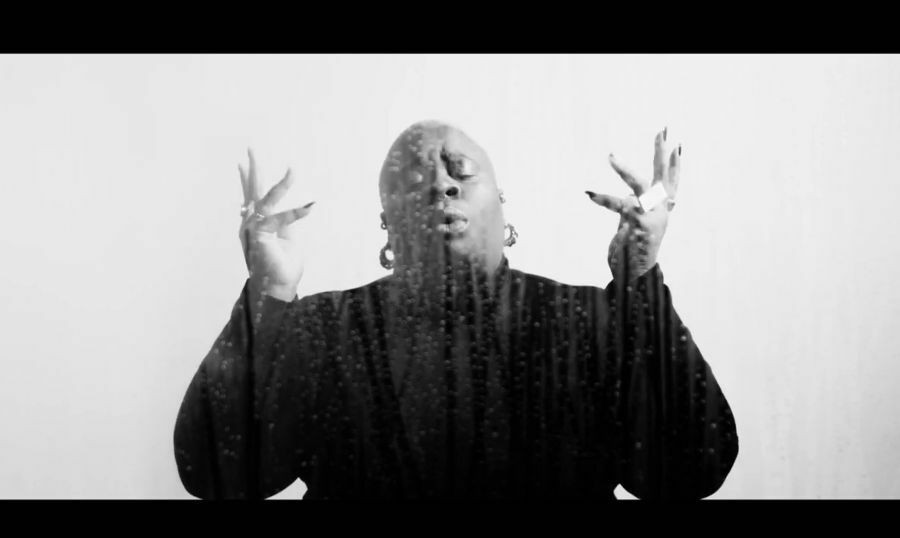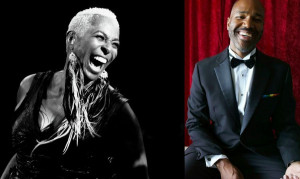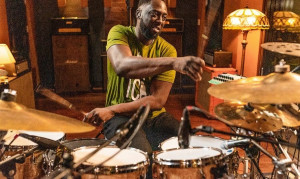But TiKA decided to step back. Instead, she took some time for herself to heal, grow, and make music on her own terms. Her debut full-length album Anywhere But Here will finally drop on February 26th, 2021, but her new single and video for “Sideways” is now available and the response from fans has been stellar. It’s a song about imbalance, yet speaking to TiKA, it’s quite noticeable how the time away from it all made space for a brand new equalized version of herself and her artistry. ByBlacks.com had the opportunity to speak to TiKA about the making of her upcoming album, the single and video, finding and reinventing yourself, and how important it is to face the darkness, evolve, and come out on the other side.
ByBlacks: It has been a long road of exploration, truths, and growth to your journey here; your debut album Anywhere But Here. Tell us what the ride has been like.
TiKA: It’s been interesting; it definitely hasn’t been cute. And I think that’s maybe perhaps the reality of a lot of journeys. It’s not cute, it’s uncomfortable. I spent a lot of time working for other people and working behind other people because I was really terrified to face myself in terms of creativity and my personal life. Distracting oneself is common when you’re a Black woman, we’re really good at doing that—overworking ourselves to a point where we’re not noticing ourselves anymore. I felt like I lost hope and faith, and I had also lost my intention. I feel like when you get to those kinds of places, you have to reevaluate why you do what you do and if your personality is aligned with what you do. I had to face the reality that I just wasn’t happy. Once I realized that, I asked myself, ’Well, what are you not happy about? What needs to change?’
ByBlacks: You said that you had to reevaluate your intentions. Music has always been such a huge component in your life. How did you pivot to return back to it?
TiKA: It was a process. The ah-ha moment happened when I was in New York. I was doing a Known Unknown event with Lil’ Mo at Milk River in Brooklyn, it was very successful. So many terrible things happened while I was out there. But the one pivotal thing that happened was before Lil’ Mo went on stage. Her opening act pulled out at the last minute and there was a wide gap in between the artist that was supposed to go on and when Lil’ Mo was to go on. The bandleader stated how the crowd was getting restless so somebody needed to do something. I picked up the mic and told them to start playing “I Would Die 4 U” by Prince, but to slow it down to make a long ballad. I started singing and after I performed, the crowd went wild. I got off stage and someone pulled me to the side and asked me if I was the organizer of this event. I said yes, and they went on to tell me that this is not what I was supposed to be doing. That singing was supposed to be what I was doing. I think that was the catalyst. That was a moment for me.
The process was really difficult. When it comes to showcases or organizing, it’s a different capacity and I had a different personality. My personality as a curator was very capitalist and hard-headed. It wasn’t a malleable personality. And singing is a very vulnerable and oftentimes uncomfortable, and open and fluid practice. So in order for me to do that, I had to change as a person. I needed to really be a lot kinder to other people and I also needed to be a lot kinder to myself. I needed to cross-examine why I had been so unkind to myself in terms of creativity and who told me why this wasn’t possible, and why I was so hard on other creative people. It took a lot of work, therapy, unravelling, unlearning and learning. There was a lot of generational and ancestral trauma and because I wouldn’t allow anyone to teach me otherwise, I had no consciousness of it.
ByBlacks: In 2019, you were featured in the Beauty and Self-acceptance ad for Sephora. Your opening words were, “...I hadn’t realized I had spent so many years working to the point where there were layers of other people’s opinions piled and piled on top of me. So I didn’t know who I was.” How much of that vulnerability and transformation do you think you’ve captured in your music on this album?
TiKA: For sure, it’s all of it. 2015 is when I recorded this project—when I came back from New York and returned to Toronto. I had just finished a successful show with Lil’ Mo and I just didn’t feel good. I didn’t feel good inside and I couldn’t identify what was wrong. All I could think about was going home. I hadn’t been home in probably two years. But when I got to my mom's house it was in complete disarray because of my younger siblings. My mom was going through immense trauma and I didn't know she needed me all the time that I was in New York. She never told me or alluded to what was happening and was kind of hiding out in her bedroom while they took over the entire house.
And when I left my mom’s house, it created a discord. I felt a great deal of shame because I couldn’t be there for my mom and I didn’t know she needed me. I moved in with a friend and lived there for six months and was literally depressed. I was living in a crawl space and was a mess. I was 29, jobless, moneyless, newly queer...and depressed.
I got a small job at a spa, and every Thursday I would get together with my friend Casey. We would drive up to his home in Brampton and we would just record and I would just purge. That was literally all I could do. I couldn’t do anything else. I was exhausted, and I was confused and had nothing to give. This was all I had in me.
ByBlacks: Was that therapeutic for you?
TiKA: Oh my god! Yeah! Because singing...it’s therapy but it’s also...how can I explain it. If I’m in a relationship and I can’t sing around that person, it’s a loud indication that I’m not supposed to be in that relationship. Singing is the most vulnerable practice. It’s like cueing into my intuition. When I’m not singing I’m not alive, I’m not as sharp. It’s an element of safety and security. It was therapy in the sense that it puts me back into balance.
When I started working with Casey, he really understood. He just got it. He was patient with me. He could tell that I had gone through some sort of trauma. There were times where I would tell him I don’t sound too good. He told me that it would take some time for me to do the work on myself so I could enjoy the sound of my own voice. He would say, “Tika, you don’t sound like anyone else for a reason.” But for me, if I didn’t sound like Whitney Houston then it wasn’t legit (laughs). Which is so crazy to even consider now, but I was serious! So part of the process was learning how to like my own voice and making peace with the idea that I don’t sound like anybody else.
ByBlacks: So with all of that purging, that’s where this album emerged…
TiKA: Oh yeah, totally. It was like this entire album is one big purge (laughs) of all the things that I had been feeling and had suppressed for a long, long time.
ByBlacks: So why now? Why release the album now? That’s five years of it marinating…
TiKA: It feels right. I feel better, a lot better. I feel more present. Why not now? We’re in a time where everything is kind of...it’s very real. People are literally dying before our eyes every single day. We have to be mindful and careful and cautious with each other and ourselves. Because it’s such a vulnerable project, and because it was during a time when I was really confused about a lot of key themes that I think a lot of Black women can identify with, I thought to myself, well why not now? It’s my offering if you will. It’s a time capsule of who I was, rather than this is who I am.
ByBlacks: You’re quoted as saying the album consists of “ethereal sounds that wrap around you, reminding you of other memories…” What type of memories did your album evoke for you when you were laying down the tracks?
TiKA: Okay, this is a great question. I love this question. There are a lot of memories and themes here because every song was written while I was in a place I didn’t want to be. Or at least I thought so. Now in hindsight, I’m realizing that it wasn’t that I hated the place, it was the fact that I couldn’t face myself. There was a lot of discomfort in that place. So, if I had a trauma that would occur in that place, I would move. I was bouncing around from home to home for a while not realizing that it was me. I needed to sit in the discomfort of it. That’s why the album is called Anywhere But Here. God! Take me anywhere but here! But it was never the environment, it was me having to constantly escape myself. It evokes memories from a time in my life that I had to deal with; relationship abuse, physical abuse, a secret relationship, sexuality and sensuality, the fragmentation of my relationship with my mom, a cover of “I Would Die 4 U” which changed everything for me...yeah, I think that’s it - love, loss, heartache, abuse...key traumas that I went through in my life at the time.
ByBlacks: Let’s talk about the single, “Sideways.” It’s delicate on the senses and then that thumping bassline comes in—it’s a beautiful balance. “I keep on falling sideways/rhythm hold me” - it sounds to me that it’s always about the music. It’s your comforter and your saviour. Why was this song chosen as the first single?
TiKA: It wasn’t intentional! It was supposed to be something else first, but that song wasn’t ready. Even though this is an unconventional single...I feel like when artists drop singles it’s more so about how they can draw you in rather than make you face yourself. I was like, is this too much and too deep too fast? (laughs) But what does it mean to be deep like this right now at a time when everything is so uncertain? We need depth. We need reality checks. We need it desperately. “Sideways” is about imbalance and making a mistake. I made a really poor mistake with a friend and I wasn’t sure we would be able to come back from it. The idea of seeing myself without this person was so foreign to me that I felt sideways. I couldn’t even envision what the future would be like without that person. The bigger picture that I take away from “Sideways” is that we have to appreciate people now. Have a sense of gratitude for who’s in our lives in the present. It’s not to bellyache about the past. Forgive yourself and do better for the people who are there for you in the present and leave it as such.
ByBlacks: The video is directed by the amazing photographer Naskademini and the visuals are beautifully monochromatic. Wow. It’s really stunning to watch. How did the idea come about?
TiKA: It was all Naska. I was really, really inspired by visuals I loved back in the day. Bilal’s “Soul Sista” is one of them. One of my favourite videos of all time. Also, Des’ree’s “You Gotta Be” is another one and Taral Hicks’ “Silly.” I felt like we needed to do a high contrast black and white. I can’t even chop it all up to myself, my creative director, Her Fly Soul - Sophie Merlin who is my stylist...we had another video shot for this before. We shot it four years ago but I didn’t feel it represented where I’m at right now. We started discussing what we could do and I was thinking of who I knew specialized in high contrast black and white. The one person I knew was Naska. I proposed the idea, he told me to send over the song, I did and he said absolutely.
I think as Black people, our realities are so deeply rooted in oppression, we don’t have senses of happily ever after for ourselves. The idea is so almost nonsensical because of the reality of our lives. Perhaps there could be a chance of reconciliation. The video is black and white all the way through until the end, that’s why I ended the video in colour. I’m a flaming optimist, so even if it’s never going to be, I still want a sense of optimism and hope that there can be a happily ever after. If we don’t have faith or hope, what do we have?
ByBlacks: And now with the pandemic at our doorstep, we sort of have to pivot with everything. Do you have virtual concerts, listening-parties and such on the horizon?
TiKA: I have an idea for a listening party that I’m down for. As for concerts, I’ve done a few virtual ones before. I’m not crazy about virtual concerts really…
ByBlacks: But there really is no way to get around it right now. What about the drive-in option?
TiKA: Yeah, I like that idea a little bit more. I don’t know how I feel about cars honking at me though. I don’t know. I feel like as women we’ve cussed up and down about cars honking at us…
ByBlacks: I think it’s the catcalling aspect.
TiKA: Yes! Exactly! So I’m like, is this what it’s come back to? (laughs) It’s so interesting. I think I will do a really cool virtual concert. Yes, it is definitely in the plans.
ByBlacks: What do you want your fans and new listeners to get from this album?
TiKA: Vulnerability, a sense of spirituality and a sense of hope. I want them to know that it’s possible to come out of the darkness. And that life, despite the way people attempt to make it look on social media, is a shit show in reality. It’s normal for it to be a shit show, but know that it’s not like that the whole time. Don’t be afraid to face yourself. As my grandmother used to say, “And this too shall pass.”
The single “Sideways” is available now on all listening platforms. Anywhere But Here will be released on Next Door Records on February 26th, 2021.

 By
By 





